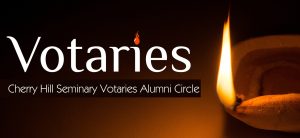Spring Semester runs Jan 12 to Apr 26, 2025. Insights course dates are noted below.
Insights (4-week courses)
If this is your first time taking a class, go here for a one-time signup. The one time fee is $20. Tuition for all Insights courses are $85 for the four-week course unless otherwise noted.
If you have done the signup before, log in to your Populi account and click “Registration is now open” on the Dashboard. Payment is due no later than two weeks before start date.
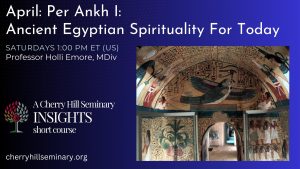
During four exciting weeks discover the landscape that inspired the world’s oldest recorded religion – the mighty Nile, the deserts, the delta and Kemet’s neighbors. Learn about several major creation myths, introduce yourselves to ancient netjeru (deities) and their temples. Consider what ancient Egypt means for us today.
Instructor: Holli S. Emore, M.Div.
Day/Time of class meetings: Saturday, 1:00 pm ET
Texts: Egyptian Mythology: A Guide to the Gods, Goddesses, and Traditions of Ancient Egypt by Geraldine Pinch. Oxford University Press, 2002.
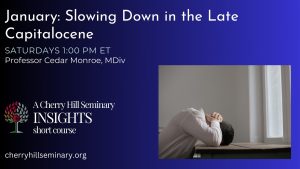
We live in a time where many of us feel stressed and overwhelmed as we struggle to care for ourselves and our communities. Religious leaders particularly feel the pressure of balancing care for their communities and care for themselves. In this class, we will explore our feelings of powerlessness, our need for rest, how to find hope for our future, and ways to stay grounded in a time of unnerving and intense change. Burnout is the hallmark of our time and healing from it will require systemic change and trusting our own leadership. The class will blend readings, reflection, and suggestions for spiritual practice.
Instructor: Cedar Monroe, M.Div.
Time: January Saturdays 1:00 pm ET
Texts: Materials provided by instructor
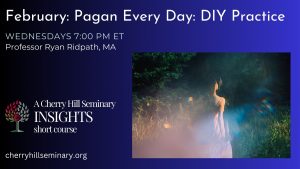
For some folks, their Pagan practice waxes and wanes with the phases of the Moon. For some, every day is a holiday! In this course, we will explore what it means for us to be Pagan every day – how it affects our work, our relationships, and of course our practice. Using a mix of historical sources and modern editorials, we will evaluate how Pagans have practiced their religion and address the obstacles they have faced to building and deepening their practice. This course encourages all to evaluate how they transmute their beliefs into daily practice for lifelong spiritual development. In the end, the goal is for students to better understand their values, their practice, and how best to DIY a spiritual practice in the absence of temples, priesthood, and sacred texts.
Instructor: Ryan Ridpath
Time: February Wednesdays, 7:00 pm ET
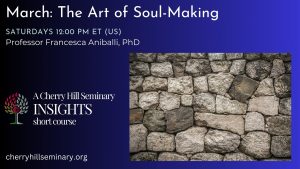
Daily life requires us to be focused on external issues and on fulfilling obligations and demands toward other people, be they family, colleagues or friends, so much so that it can be hard to tune in to our deeper needs.
In this experiential course, we will cultivate a transformative process to withdraw our senses and attention from the many demands placed on us by society and focus on connecting to Soul. We will nurture this connection through imagination, and invite inspiration and intuition through a mindful and creative step-by-step process. The only materials needed are pens, pencils, paper and your favourite oracle or inspiration card deck.
Instructor: Francesca Aniballi, PhD
Classes: Saturdays, March 1, 8, 15, 22 at 12:00 pm ET
Texts required: none
Graduate Courses – registration now closed for Spring
Log in to your Populi account to register. Note that a non-refundable deposit of $200 must be paid by Dec 22. (Deposit will be refunded if class is cancelled.) Tuition rates
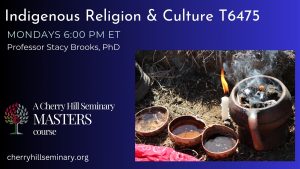
A survey of indigenous, place-based and land-based traditions that are not part of the contemporary Pagan movement. Native American religions, Afro-Caribbean traditions, shamanisms around the world, Hinduism, Australian aboriginal traditions, and more.
Instructor: Stacy Brooks, Ph.D.
Day/Time of class meetings: Monday, 6 pm ET
Texts:
Cajete, Gregory. Native Science: Natural Laws of Interdependence. Santa Fe: Clear Light Publishers, 2000.
Hillman, James. Archetypal Psychology: A Brief Account. Washington DC: Spring Publications, 1983.
Levine, Lawrence. Black Culture and Black Consciousness: Afro-American Folk Thought from Slavery to Freedom. New York: Oxford UP, 1977.
P6700 Sexuality, Culture & Religion
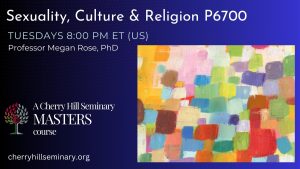
Instructor: Megan Rose, Ph.D.
Day/Time of class meetings: Tuesday, 8 pm ET
Text: Middleton, DeWight R. Exotics and Erotics: Human Cultural and Sexual Diversity. Waveland, 2001.

A survey course introduces students to the wide variety of Paganisms being practiced around the world, challenging scholarly and personal definitions of Paganism by tracing common threads among disparate traditions. Students will then explore the Internet and their local communities to gain first-hand experience with traditions not their own. We address issues of cultural appropriation versus appropriate cultural borrowing and consider Paganism’s position as a consciously (re)constructed, combinative religious path. A final project allows students to synthesize their knowledge in a comparison of Paganisms that supports the unique thrust of each student’s ministerial path.
Instructor: Michael Strmiska, Ph.D.
Day/Time of class meetings: Saturday, 10:30 am-12 pm ET
Texts:
John Salibi, Understanding New Religious Movements, 2nd Edition Revised Edition (2003)
Michael F. Strmiska, Modern Paganism in World Cultures: Comparative Perspectives (2005).



